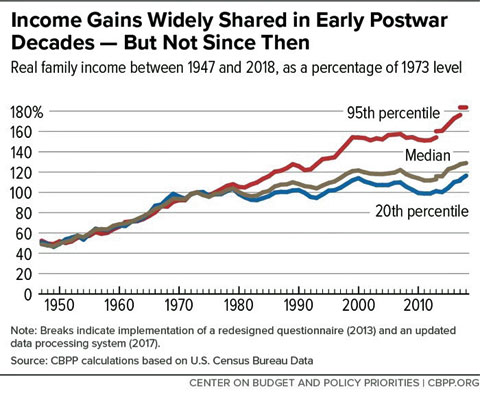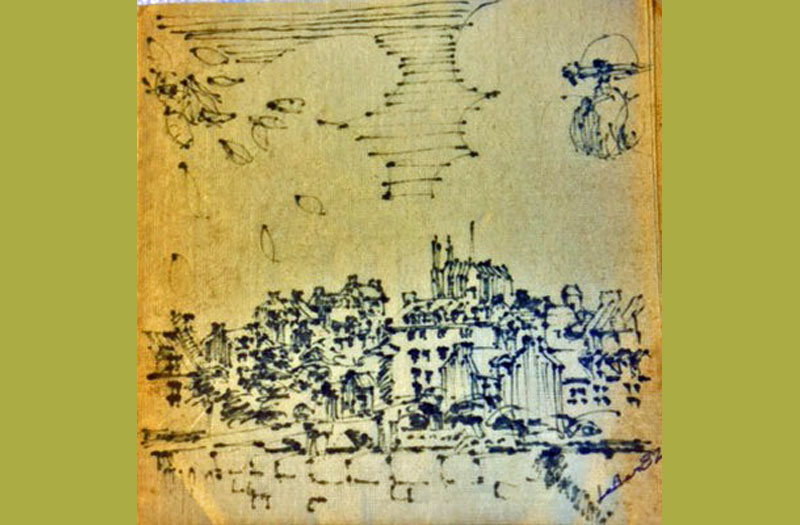Everyone is entitled to his own opinion, but not his own facts. Senator Daniel Patrick Moynihan
There are: no facts, only interpretations. Friedrich Nietzsche
What happened to our “shining city upon a hill?” The concept was always a myth but one that held us together. Now there is trouble on the hill and it is tearing us apart. Back in 2016 during the election that gave us President Donald Trump, I wrote a blog where I explained my concerns about why the country had grown so divided. Everything I said then still applies. Economists have focused too much on growth and too little on distribution. For an entire generation since 1980 the rich have grown richer and the rest of the population has been left behind.

The idea of a shining city upon a hill has inspired Americans since the Puritan John Winthrop gave his sermon A Model Of Christian Charity. Politicians of all persuasions have used the myth to encourage charity, communalism and unity but also to further their own individual beliefs. Politicians like all others, are, as Nietzsche says, “human, all too human.”
Here is what President Kennedy had to say about the shining city on a hill back in the 60s.
… I have been guided by the standard John Winthrop set before his shipmates on the flagship Arabella (sic) three hundred and thirty-one years ago, as they, too, faced the task of building a new government on a perilous frontier. “We must always consider”, he said, “that we shall be as a city upon a hill—the eyes of all people are upon us”. Today the eyes of all people are truly upon us—and our governments, in every branch, at every level, national, state and local, must be as a city upon a hill—constructed and inhabited by men aware of their great trust and their great responsibilities. For we are setting out upon a voyage in 1961 no less hazardous than that undertaken by the Arabella(sic) in 1630. We are committing ourselves to tasks of statecraft no less awesome than that of governing the Massachusetts Bay Colony, beset as it was then by terror without and disorder within. History will not judge our endeavors—and a government cannot be selected—merely on the basis of color or creed or even party affiliation. Neither will competence and loyalty and stature, while essential to the utmost, suffice in times such as these. For of those to whom much is given, much is required … John F. Kennedy, 1961
Kennedy wanted to rally the country, bring it together, vanquish the “disorder within” so that we could confront the “terror without”. President Reagan, at the end of his two terms in office, explained what the shining city meant to him.
I’ve spoken of the shining city all my political life, but I don’t know if I ever quite communicated what I saw when I said it. But in my mind it was a tall, proud city built on rocks stronger than oceans, wind-swept, God-blessed, and teeming with people of all kinds living in harmony and peace; a city with free ports that hummed with commerce and creativity. And if there had to be city walls, the walls had doors and the doors were open to anyone with the will and the heart to get here. That’s how I saw it, and see it still. Ronald Reagan, 1989
Reagan stressed a multicultural country blessed by God with its people “living in harmony and peace” where free trade, free enterprise, and creativity were encouraged and all people were welcome.
President Obama spoke about the shining city in a commencement speech at the University of Massachusetts in 2006 long before he was elected President. He stressed the ethnic diversity and opportunity for all envisioned by our earliest settlers in their dream of a city upon a hill.
It was right here, in the waters around us, where the American experiment began. As the earliest settlers arrived on the shores of Boston and Salem and Plymouth, they dreamed of building a City upon a Hill. And the world watched, waiting to see if this improbable idea called America would succeed. More than half of you represent the very first member of your family to ever attend college. In the most diverse university in all of New England, I look out at a sea of faces that are African-American and Hispanic-American and Asian-American and Arab-American. I see students that have come here from over 100 different countries, believing like those first settlers that they too could find a home in this City on a Hill—that they too could find success in this unlikeliest of places. Barack Obama 2006
Americans are not exceptional. We are human beings like all others, warts and all. But even when we fail to live up to John Winthrop’s vision, we continue to be inspired by it. What is exceptional about America is its form of government and the values enshrined in the Constitution and the Bill of Rights. When we are at our best we can discuss, disagree, even argue but always find a way through, a means of coming together and moving forward. We fail when we lose trust, when the inequities in our system feel unfair, when life’s insecurities increase fears and decrease hopes. This leads to a destructive despair and brings out the worst in our human nature to divide us. That we currently live in such a dark time should be obvious to anyone paying attention.
The fact is an economic environment that encourages growth and productivity by its very nature produces winners and losers. Free trade (based on the principle of comparative advantage) is not free to those who lose their jobs even if it expands overall income. Creative destruction energizes an economy with new products and methods of production, rings out the old and rings in the new, but the benefits are a bittersweet prospect for those who cling to the old.
There are no easy fixes to the pain that any economic system causes. And, they all cause pain—no pain, no gain. That is equally true for a system based on tradition, command, the market or some mix of each. No easy fixes does not mean no fixes. As President Kennedy said: “For of those to whom much is given, much is required.” We must find a way to fairly share both the costs and the gains of the economic system if both that system and our country are to survive.
We need to return to the idea of the shining city on the hill. Not that I believe for a minute that we’ve ever actually been there but the idea is what distinguishes us as Americans—an idea that could inspire and motivate such diverse leaders as Winthrop, Kennedy, Reagan and Obama not to mention so many others, but not all as we can see today.
The trouble on the hill has been brewing for forty years but it’s worse now than it’s ever been. It is toxic. We need to toss the brew before it’s too late.
Song of the Witches: “Double, double toil and trouble”
(from Macbeth)
Double, double toil and trouble;
Fire burn and caldron bubble.
Fillet of a fenny snake,
In the caldron boil and bake;
Eye of newt and toe of frog,
Wool of bat and tongue of dog,
Adder’s fork and blind-worm’s sting,
Lizard’s leg and howlet’s wing,
For a charm of powerful trouble,
Like a hell-broth boil and bubble.
Double, double toil and trouble;
Fire burn and caldron bubble.
Cool it with a baboon’s blood,
Then the charm is firm and good.

